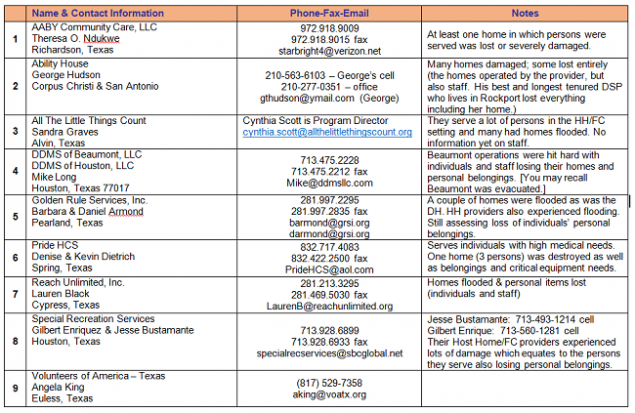Emergency Preparedness & Response
From natural disasters like hurricanes and tornadoes to public health crises like the spread of infectious disease, emergencies leave all of us with the task of planning for the safety of our loved ones and making sure we’re safe. Providers face these same challenges, plus many more related to ensuring the safety and well-being of the people they support. Below are details of specific needs for members affected by these catastrophic events.
March 2020: COVID-19 Resource Center
Diagnoses of COVID-19, or the coronavirus, have been making the news in recent weeks. Although being prepared is critically important, the Centers for Disease Control & Prevention are advising that most people in the United States have little risk of exposure to the virus. To learn more and understand the situation, please visit ANCOR’s COVID-19 Resource Center.
General Disaster Planning Resources
— For general tips on how people with disabilities can prepare for a disaster, visit:
- Make a Plan – Individuals with Disabilities, ReadyGov
- Preparing for Disaster for People with Disabilities and Other Special Needs, FEMA
- Emergency Preparedness for People with Disabilities, CDC
- LTSS Emergency Food Plan Preparedness and Relief, My25
- Offer of Civil Rights Compliance Assistance – Letter from DOJ and DHS to State and Local Emergency Management Agencies, ADA.gov
- Ensuring Language Access and Effective Communications During Response and Recovery: A Checklist for Emergency Responders, HHS
- Capacity-Building Toolkit for Including Aging and Disability Networks in Emergency Planning, NACCHO
- Emergency Preparedness for PWD Before a Disaster, AAPD
— If you would like to offer additional resources or share other ways to help, please contact [email protected]
Resources for Oklahoma Tornado
— President approves Oklahoma’s Declaration of Emergency
Resources for Alaska Earthquake
— Secretary of Health and Human Services Alex Azar declared the earthquake a public emergency, giving more flexibility to Medicare and Medicaid beneficiaries to meet emergency health needs.
— The SAMHSA Disaster Distress Helpline is a toll-free, multilingual line “dedicated to providing immediate crisis counseling for people who are experiencing emotional distress related to any natural or human-caused disaster”.
— The Alaska Division of Homeland Security and Emergency Management says it will activate Alaska’s Individual Assistance Hotline on Tues., Dec. 4 at 8 a.m, KTVA News
Resources for Hurricane Florence
— The Administration for Community Living (ACL) has compiled general and I/DD-specific resources.
— The Federal Emergency Management Agency (FEMA) has compiled resources for Hurricane Florence.
— U.S. Health and Human Services (HHS) Secretary Alex Azar has declared the hurricane a public health emergency, giving more flexibility to Medicare and Medicaid beneficiaries to meet emergency health needs.
State-specific Resources from Previous Disasters
OMB Hurricane Administrative Waiver Letter (Harvey, Irma and Maria)
The Office of Management and Budget (OMB), sent a Hurricane Waiver letter to agency Chief Financial Officers and Grant Policy Officials. The Hurricane Waiver letter grants authority to agencies to provide administrative relief for grantees (estimated at 4,000) affected by Hurricanes Harvey, Irma and Maria. The administrative relief includes an extension for grantees to apply for eligible grants, to submit financial and technical reports, and to complete the required audit reports.
For more information read the letter in NGMA’s Grants Guidance section!
California
The California Foundation for Independent Living Centers has established the Richard Devylder Disaster Relief Fund. Donations made to the fund will be used to assist survivors with disabilities across the state who have lost their critical mobility and accessibility devices such as wheelchairs, scooters, walkers, canes, hearing aids and communication devices in the fires
Puerto Rico
Portlight Strategies, Inc. is a 501(c)(3) organization, founded in 1997 to facilitate a variety of projects involving people with disabilities, including post-disaster relief work. Click here to donate.
Florida
For those of you who want to make a charitable contribution for Floridians, Governor Rick Scott has activated the Florida Disaster Fund to support individuals who are impacted by Tropical Storm Irma. The Florida Disaster Fund helps provide financial support to Florida’s communities in times of disaster.
To make a contribution, please visit www.FloridaDisasterFund.org or text DISASTER to 20222 to make a one-time donation of $10. Volunteer Florida has also engaged with Facebook to activate a donation portal online.
Texas
California Wildfires Resources
— October Wildfires Resources and Information, California Governor’s Office of Emergency Services (OES).
— Governor Jerry Brown’s Announcement on Federal Aid to California, Office of the Governor.
Hurricane Maria Resources
— CMS has added information specific to Hurricane Maria, as well as Hurricane Nate.
— Portlight providing UCEED and ILC in Puerto Rico energy for wheelchair charging.
Hurricane Irma Resources
— HHS Secretary Price declares public health emergency in Florida due to Hurricane Irma, HHS.
— To see the federal government’s Hurricane Irma-specific resources, visit: Hurricane Irma, FEMA
Hurricane Harvey Resources
— For ways to donate to more general causes, visit: Where to Donate to Harvey Victims (and How to Avoid Scams), The New York Times
— Hurricane Harvey Resources for People with Disabilities, Access & Functional Needs, FEMA
— CMS Hurricane Harvey Response and Information, CMS
— Important Social Security Information for People Affected by Hurricane Harvey, SSA
— Hurricane Harvey Resources: Inclusive Emergency Response, ACL

